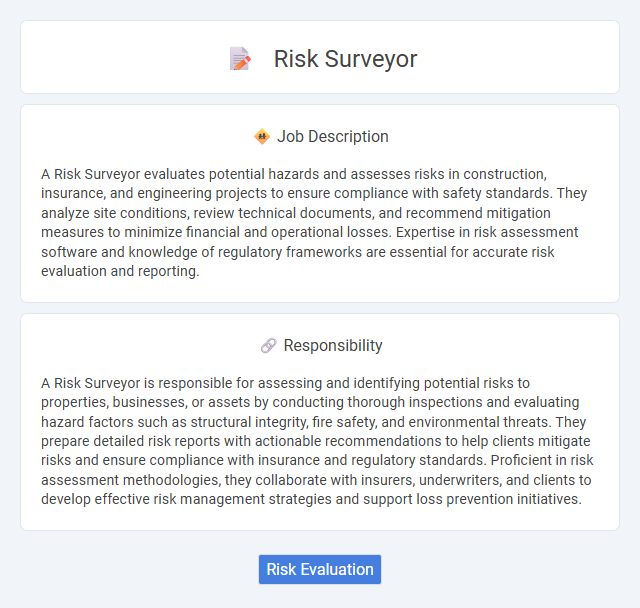
A Risk Surveyor evaluates potential hazards and assesses risks in construction, insurance, and engineering projects to ensure compliance with safety standards. They analyze site conditions, review technical documents, and recommend mitigation measures to minimize financial and operational losses. Expertise in risk assessment software and knowledge of regulatory frameworks are essential for accurate risk evaluation and reporting.
Individuals who possess strong analytical skills and attention to detail are likely suitable for a Risk Surveyor role, as the job requires assessing potential risks and evaluating conditions meticulously. Candidates comfortable with fieldwork and report writing probably adapt well to the dynamic nature of the position, which involves both site inspections and documentation. Those who thrive in environments demanding critical thinking and problem-solving may find this career fulfilling and aligned with their capabilities.
Qualification
A Risk Surveyor typically holds a degree in risk management, insurance, or a related field, often supplemented with professional certifications such as CII (Chartered Insurance Institute) qualifications or CRO (Certified Risk Officer). Strong analytical skills and experience in health and safety regulations, insurance policies, and risk assessment methodologies are essential. Proficiency in data analysis tools and excellent communication abilities enhance the effectiveness in identifying and mitigating potential risks for various industries.
Responsibility
A Risk Surveyor is responsible for assessing and identifying potential risks to properties, businesses, or assets by conducting thorough inspections and evaluating hazard factors such as structural integrity, fire safety, and environmental threats. They prepare detailed risk reports with actionable recommendations to help clients mitigate risks and ensure compliance with insurance and regulatory standards. Proficient in risk assessment methodologies, they collaborate with insurers, underwriters, and clients to develop effective risk management strategies and support loss prevention initiatives.
Benefit
Risk Surveyor roles likely offer substantial benefits including comprehensive health coverage and competitive pension schemes, which can enhance long-term financial security. Employees might also have access to professional development programs and industry certifications, increasing career advancement opportunities. These positions could provide flexible working arrangements, potentially improving work-life balance and overall job satisfaction.
Challenge
The role of a Risk Surveyor likely involves navigating complex and unpredictable environments, which presents significant challenges in accurately assessing potential hazards and risks. There is a strong probability that the job requires constant adaptation to evolving regulatory standards and emerging market threats. Mastery of analytical skills and a proactive approach may be essential to effectively mitigate risks and ensure comprehensive evaluations.
Career Advancement
Risk Surveyor roles offer significant opportunities for career advancement through gaining expertise in risk assessment, data analysis, and compliance management. Progression often leads to senior positions such as Risk Manager, Insurance Underwriter, or Compliance Officer, with increased responsibilities in strategic decision-making and regulatory adherence. Certifications like CRISC or ARM enhance prospects for leadership roles and specialization within sectors such as finance, insurance, or construction.
Key Terms
Risk Evaluation
Risk Surveyors specialize in risk evaluation by systematically assessing potential hazards and vulnerabilities within commercial, residential, or industrial properties. Their expertise involves analyzing environmental, structural, and operational factors to determine the likelihood and impact of risks, providing detailed reports crucial for insurance underwriting and risk mitigation strategies. Precision in risk evaluation enables organizations to make informed decisions on coverage terms, premiums, and necessary risk control measures.
 kuljobs.com
kuljobs.com